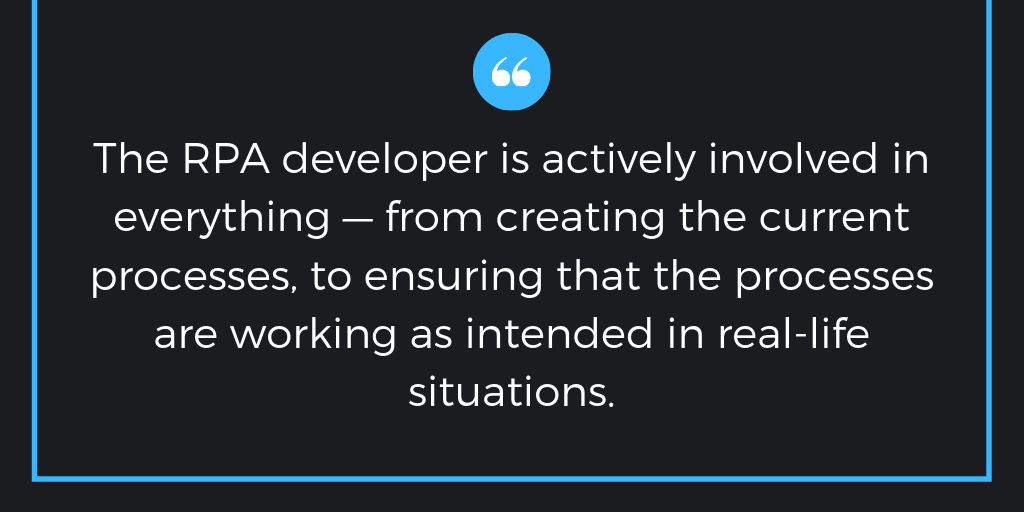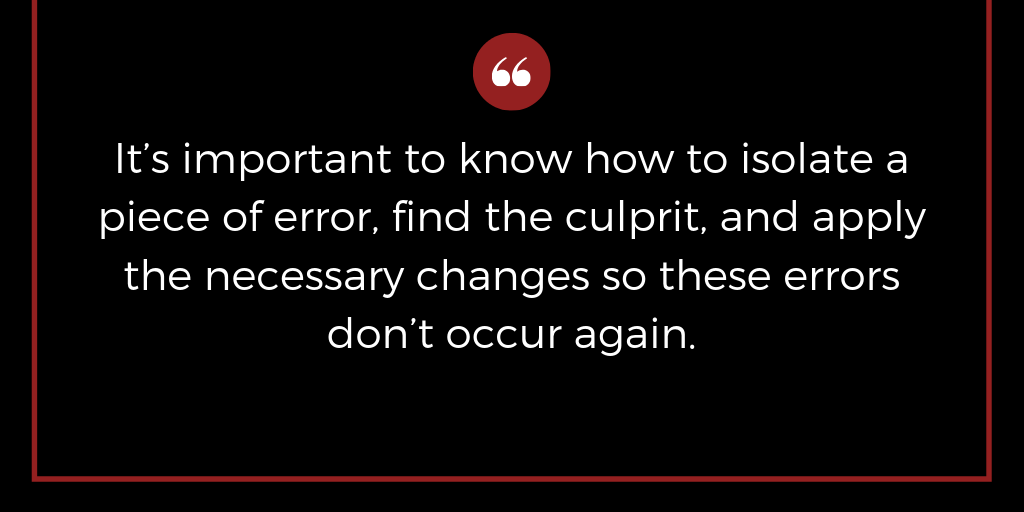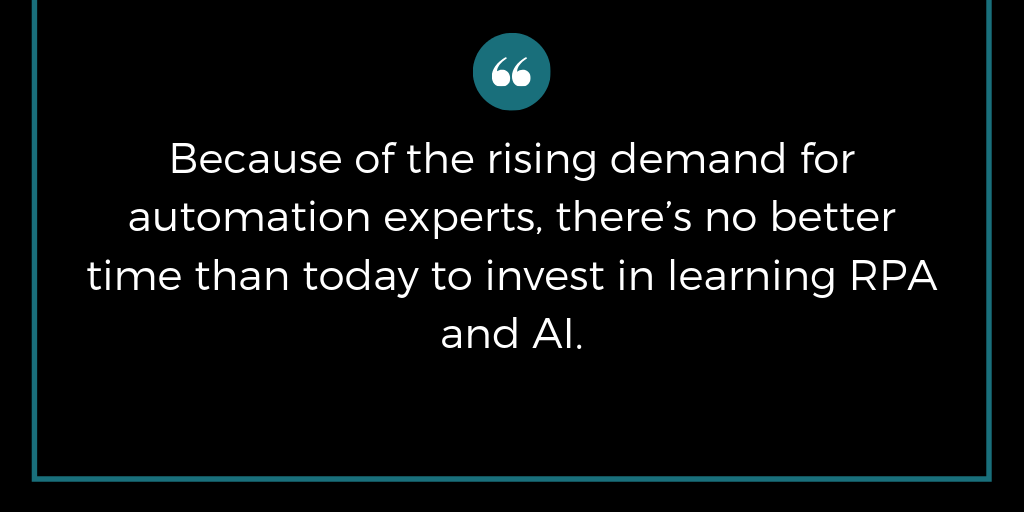Artificial Intelligence (AI)
How Do I Become a (Robotic Process Automation) RPA Developer?
The RPA developer is actively involved in everything from creating the current processes to ensuring that the processes are working as intended in real-life situations.

RPA, or Robotic Process Automation (RPA), is one of the latest technologies in the fields of production and Artificial Intelligence (AI). With RPA, many of the simple tasks of yesterday that used to be done by humans are now done by machines. This has given rise to the age of automation.
And in the age of automation, the RPA developer is king.
Table of Contents
1. Why is RPA relevant now?
RPA is a booming industry because of these 3 main reasons:
- Employees require the use of a larger number of tools compared to before, making it unfeasible to automate tools and interactions with simple macros.
- RPA alternatives, such as outsourcing, no longer create the same level of benefits since our current technology makes RPA the most efficient method for many tasks.
- RPA can act as a digital spine to connect multiple applications, making it more convenient to program and deploy automated tasks across multiple platforms.
2. What does an RPA developer do?

(Image created with Canva.com)
One of the responsibilities of an RPA developer is to build effective systems and processes that can reduce the involvement of humans.
Typically, an RPA developer wears three hats:
- Process Designer
- Production Manager
- Automation Architect
The RPA developer is actively involved in everything, from creating the current processes to ensuring that the processes are working as intended in real-life situations.
In larger companies, however, several RPA developers will usually be needed, with each individual assigned a narrower set of responsibilities.
This is often preferable since it allows the developers to hyper-focus on their field of work, which can translate to increased efficiency and fewer inaccuracies.
3. What it Takes to Become an RPA Developer

(Image created with Canva.com)
When employers look for an RPA developer, they are also looking for specific backgrounds, skills, and experience, such as the following:
Problem-solving and analytical skills
A good understanding of workflow-based logic is essential in robotic process automation and AI development.
Furthermore, there will always be software issues on the job. Sometimes, RPA software may not work as it’s supposed to and it’s the developer’s responsibility to find out why.
To become a good RPA developer, you’ll need to know how to overcome these difficulties and see them as a natural part of your day-to-day operations.
Experience with RPA technologies
Anyone who wants to call himself an RPA developer should be familiar with UiPath, Blue Prism, Automation Anywhere, and other RPA technologies.
Invest in taking an RPA UiPath certification course training, as well as other necessary training programs that can help grow your skillset and strengthen your resume.
Knowledge of SQL and Relational Database Design
Quite often, the data that bots use is available in databases, most of which are relational by nature.
Instead of humans accessing this data, it may be far more efficient for bots to do so through proper SQL queries.
This is why advanced knowledge of SQL and a good understanding of relational database structures are essential.
Debugging and Testing Robots
Robots don’t always work as intended during the first few tests. Hence, one needs to have a solid understanding of how to find bugs in the script, code, or workflow, depending on the tool.
It’s important to know how to isolate a piece error, find the culprit, and apply the necessary changes so these errors don’t occur again.
For this, you’ll need to practice with real applications to learn relevant debugging methods and use concepts like equivalence classes and boundary testing.
4. RPA Prospects
The current RPA market is still small. However, by 2020, research suggests that the expenses for RPA-related growth will reach a staggering USD 1 billion.
By this time, it’s estimated that at least 40% of large companies will use RPA tools in daily operations to increase work efficiency and eliminate repetitive tasks.
RPA and AI marketing are also increasing in demand, with AI being used to bridge the gap between analytics and new data-driven marketing methods.
5. For those undecided about becoming an RPA developer:
Average RPA developers tend to be paid more competitively compared to other professions.
The average wage for RPA developers is around $90,000 annually, according to statistics released by Neuvoo.
For senior developers, the rates can easily go above $100,000, making it a well-paid field compared to other skilled professions.
The learning curve for RPA software isn’t that high.
RPA programming is considered the highest level of programming language, but RPA software can do in one line of code what other languages would take multiple lines to do.
This is one curious thing about programming. The lower the level of a programming language, the more difficult it is to learn.
With RPA, most of the instructions tend to be about processing data, passing data to different systems, and manipulating items on a screen.
6. Being a developer isn’t the only way to jump on the RPA bandwagon
If you’re merely interested in being a part of the RPA boom, there are other job roles worth considering. The following roles are also crucial for a successful RPA project:
Project Manager
The same as any other project, RPA projects require a manager to ensure that requirements are completed, deadlines are met, and tasks are done within the specified budget.
Requirements include:
- 2-3 years of professional experience
- Experience in managing previous projects and knowledge of risk assessment procedures, client communication, etc.
- Basic knowledge of how RPA works
Business Analyst
Some of the responsibilities of a business analyst overlap with those of a process analyst, which can still be fulfilled by the RPA developer.
The job of a business analyst is to identify improvement and automation opportunities, as well as perform a zero-based design of the process for successful execution.
Requirements include:
- Strong analytical and problem-solving skills
- good understanding of the process and ability to redesign it
- Knowledge or certification in RPA software, process optimization, design thinking, user acceptance testing (UAT), and gathering business and technical requirements
7. Conclusion

(Image created with Canva.com)
Even non-programmers can become RPA developers. Granted, there will be certain limitations to what they can automate, and they’ll go through a much higher learning curve.
For people who are already in the programming field, however, RPA will come more naturally.
Because of the rising demand for automation experts, there’s no better time than today to invest in learning RPA and AI. It’s no exaggeration to say that our future is greatly shaped by these two technologies.
Helpful Resources:
1. Impact of Artificial Intelligence (AI) on the Software Development Industry
2. Do Human Translators Have a Reason to Be Afraid of Advancing Technologies
3. Artificial Intelligence And Its Demands To The Programmers
4. Top 20 Working 13377x Proxy List
5. E-commerce Chatbots: 13 Ways to Increase Sales, Conversions & Retention
6. Top 10 Artificial Intelligence (AI) App Development Trends
-

 Instagram4 years ago
Instagram4 years agoBuy IG likes and buy organic Instagram followers: where to buy them and how?
-

 Instagram4 years ago
Instagram4 years ago100% Genuine Instagram Followers & Likes with Guaranteed Tool
-

 Business5 years ago
Business5 years ago7 Must Have Digital Marketing Tools For Your Small Businesses
-

 Instagram4 years ago
Instagram4 years agoInstagram Followers And Likes – Online Social Media Platform















